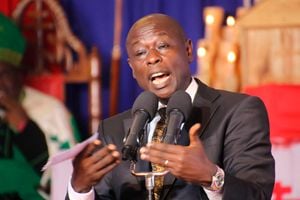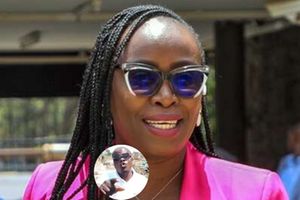Will civil society survive Uhuru’s presidency?
What you need to know:
- Will Mr Kenyatta behave more like the repressive Moi-Kanu regime, or the cunning but corrupt Kibaki state? How will Mr Ruto and Mr Kenyatta respond to increasing pressure from the ICC?
- Will they strike out against the court? How safe are the witnesses against them? They say a caged animal is deadly. Will they take it out on civil society?
Let me tell you something you already know. There’s no love lost between the civil society and President Uhuru Kenyatta. None – zilch. Some of us – like yours truly – are “conscientious objectors” to his “election” as President of Kenya.
This is what I tweeted on April 3 – “As a matter of my freedom of conscience and thought, I can’t accept Uhuru Kenyatta as President of Kenya. I can’t and I won’t.” There was an earthquake. I was immediately besieged by bloviators and Jubilee supporters.
Every single insult and epithet known to man was hurled at me. But many who felt like me – but couldn’t, or wouldn’t speak up – send me quiet messages of support. I knew I wasn’t alone.
One Eric Ng’eno, profession unknown, wrote a screed against me (“Uhuru does not need Prof Mutua’s endorsement,” Daily Nation, April 5).
Then veteran journalist, and erstwhile friend Mwenda Njoka, “advised” me to accept Mr Kenyatta as my President and offer him “constructive criticism” (“An open letter to my friend, the good old Prof Mutua, Standard, April 7). For the record, I am not “old”.
Even Daily Nation Managing Editor Mutuma Mathiu, an old friend, took a swipe at me in his column “Uhuru won, but he should not take us back to Moi or Kenyatta era” (Daily Nation, April 11).
Star columnist Mugambi Kiai stripped them bare (“Letter to my dearly beloved Makau Mutua,” Star, April 13). In “It’s weird not to expect Makau Mutua to speak his mind,” (Sunday Nation, April 14) columnist Jack Otieno Otieno eloquently defended me.
This hullabaloo was caused by one tweet with 140 characters. I’ve pondered the meaning of all these diverse responses to my statement of conscience.
Let me clear one thing to set things straight. If there’s one thing that’s sacred about an individual, it’s their conscience and freedom of thought.
That, more than anything else, is what makes us uniquely individual. It’s the single most important – and unarguable foundation – of a democratic society.
That’s why constitutions – including Kenya’s – protect the freedom of conscience and thought without qualification. It’s a freedom that can’t be given, or taken away, by a state. Civil society is the most reliable guardian of these freedoms. That because the state is an untrustworthy protector of human rights.
This is the question – what’s civil society to do if it feels so strongly about the Kenyatta regime? There’s no doubt Mr Kenyatta and his government have the support of a lot of Kenyans. That’s unarguable. But there are many Kenyans who are apathetic.
Take it from me – apathy is strongest in civil society. It’s an “existential moment” for some of the leading lights of civil society.
They feel betrayed by a population they’ve always fought for. In fact, most of the freedoms Kenyans enjoy today were made possible by civil society, including the 2010 Constitution.
Many are questioning the ability of the human rights movement to uproot embedded tribalism and the money corruption of the wealthy.
No one knows whether civil society will survive the Kenyatta regime and, if so, in what shape. We are in uncharted territory. But I can point to some possible routes. I believe Mr Kenyatta understands that his regime suffers from a “legitimacy deficit”.
That’s because of the charges against him at The Hague and the contested nature of the election. He may try to co-opt some civil society leaders into his regime to shore up his credibility.
There are signs that some important civil society doyens are fighting to catch his eye. Yes – we have opportunists in civil society too. Some of them have denounced principles they’ve long held to prove their loyalty to Mr Kenyatta.
Secondly, others may accept the outcome of the election and “move on,” as has been urged. This cohort would simply go back to the trenches and continue their fight for human rights – much in the same way they did under former President Kibaki.
Their job would be to “monitor” Mr Kenyatta’s government, “hold it accountable,” and “protect” the gains in the 2010 Constitution. You can be sure there will be donor funding for such “constructive engagement”.
These “true believers” are professional human rights workers whose view of the world isn’t jaundiced. They know that “engaging” the Kenyatta state and “dialoguing” with it can only further legitimise it. But to them, this is the best of terrible options.
Thirdly, there is a group that’s likely to disengage, and “divorce” the human rights movement. This chunk may “resign” from civil society. A number may even “divorce” Kenya. Some may go for further studies, or join the private sector. This group took Mr Kenyatta’s election the hardest, and cannot reconcile itself to the choice of a supposed plurality of Kenyans.
But others in this group will take a reflective view and calibrate their future options. Many will be keenly watching The Hague trials. That’s because a conviction of either Mr Kenyatta or Deputy President William Ruto, or both, would be a game-changer. But that’s a long way off, and the wait will be torturous and the outcome uncertain.
Finally, it’s anyone’s guess how the Kenyatta state will respond once civil society recovers from the shock of the moment and reasserts itself.
We know that state-civil society relations have been very dicey in the past. Will Mr Kenyatta behave more like the repressive Moi-Kanu regime, or the cunning but corrupt Kibaki state? How will Mr Ruto and Mr Kenyatta respond to increasing pressure from the ICC? Will they strike out against the court? How safe are the witnesses against them? They say a caged animal is deadly. Will they take it out on civil society?
Makau Mutua is the Dean and SUNY distinguished professor at SUNY Buffalo Law School and chair of the KHRC Twitter @makaumutua




